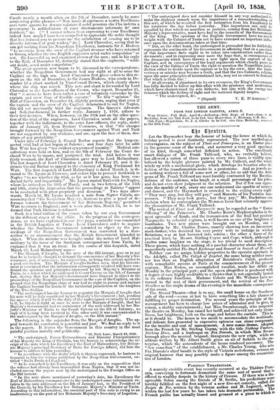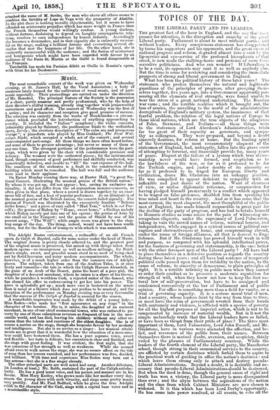il4r Shratrts.
Let the Haymarket bear the honour of being the house at which the holiday period is most distinctly represented. The new mythological extravaganza, on the subject of Plato and Proserpine, is an Easter piece in the genuine sense of the word, and moreover a very good specimen of its kind, though somewhat deficient in action. The excellently smart dialogue of Mr. Frank Talfourd, who, we veritably believe, has allowed a ration of three puns to every two lines, is visibly sym- bolized by the bright pictures painted by Mr. Callcott, and the whole winds up with a mechanical glory, which develops its beauties after the fashion of the transformation-scene in a pantomime. And as jewels are as nothing without a foil of some sort or other, let us add that the Attic gems of Mr. Frank Talfourd are most forcibly contrasted by the Bceotian dulness of the audience, who laugh at a small percentage of his jokes, and do not even show judgment in the selection. But if few can appre- ciate the sparkle of wit, every one can understand the sparkle of swim- and dances, and the Haymarket is crowded to the ceiling every night "They may sing, but they will pay," said Maztuin of his Parisian lam-
pooners. They may look grave, but they pay," Mr. Buckstone can exclaim when he contemplates the Memnon faces that solemnly approve the pleasantries of Mr. Frank Talfourd.
The revival of Faust and Hargner;te may be regarded as the "Easter Offering" of the Princess's. Mr. Charles Kean's Mephistopheles is the most agreeable of fiends, and the transmission of the frail but penitent Marguerite to celestial regions, is well known as one of the brightest of beatitudes. Two new pieces were brought out on Monday, one a comedietta by Mr. Charles Dance, smartly showing how an inconstant stock-broker, who deceived his very pretty wife to indulge in wicked flirtations, was at last harassed into reform ; the other a farce of the practical kind, by Messrs. Stirling Coyne and Cope, which, although it excites sonic laughter on the stage, is too trivial to need description. These pieces, which have nothing of a paschal character about them, are respectively entitled The Stock Exchange and Samuel in Search of Himself. Neither can we assign holiday properties to the operatic spectacle at the Adelphi, called The Caliph of Bagdad, the same being neither more nor less than an English adaptation of Boieldieu's produced with remarkable success at Paris at the commencement of the present century. Miss Roden, an accomplished vocalist, made her debilt on Monday in the principal pert; and the opera altogether is produced with a degree of care highly creditable to a theatre that is not especially lyrical in its ordinary functions. Madame Celeste and Mr. Webster have re- turned to the seat of their government, and the revival of the Poor Strollers as the staple drama of the eveningis the immediate consequence of the event.
The Strand Theatre—that is to say, the small house on the Southern side of the road—seems at last to have something like a feir chance of fulfilling its proper destination. For several years the principle of the management has been to charge low prices of admission and to give, in return, a shabby entertainment ; but Miss Swanborough, who reopened the theatre on Monday, has raised her tariff, and achieved not only clean- liness, but brightness, both on the stage and before the curtain. This is as it should be. The house is too small to accommodate the multitude, and delicate fare presented to expensive epicures can alone compensate for the trouble and cost of management. A new comic drama, adapted from the French by Mr. Stirling Coyne, with the title Nothing Venture, Nothing Have, and a burlesque on Fra Diavolo, in which Miss Swan- borough plays the musical brigand, .inaugurate the new reign, while an address written by Mr. Albert Smith gives an air of fashion to the en- terprise, which the antecedents of the house rendered necessary. The "low comedian" of the establishment, a Mr. Charles Young, who acts Fra Diavolo's chief bandit in the style of Victoria melodrama, evinces an original humour that may possibly make a figure among the eccentrici- ties of London.
PARISIAN THEATRICALS.
A scarcely credible event has recently occurred at the Maitre Fran- cais, conveying to fortunate dramatists the same sort of moral that's offered to wealthy despots in the history of Crcesus. If there was a dis- agreeable Solon among the friends of M. Seribe, his predictions were terribly fulfilled on the first night of a new five-act comedy, called Ids Doigts de Fee, written by the veteran author and M. Legouve, whom within the last few years he has taken into dramatic partnership. The French public has actually hissed and groaned at a piece to which m
attached the name of M. Scribe, the man who above all others seems to combine the fertility of Lope de Vega with the prosperity of Aladdin. In the plot there is nothing morally objectionable, but it seems to have offended an aristocratic prejudice which has more weight in France than the French themselves would willingly confess. A young duchess, without fortune, disdaining to depend on haughty unsympathetic rela- tions, resolves to earn independence by honest industry. Accordingly she becomes a dressmaker, and in that capacity she is eminently success- ful on the stage, making a brilliant fortune and oversetting several ob- stacles that mar the happiness of her life. On the other hand, she is eminently unsuccessful with the audience ; and the fusion of aristocracy and bourgeoisie which might have been regarded with favour by an audience of the Porte St. Martin or the Gate is found disagreeable at the Francais. Tamberlik has made his Parisian debt as Otello in Rossini's opera, with Grisi for his Desdemona.



























 Previous page
Previous page